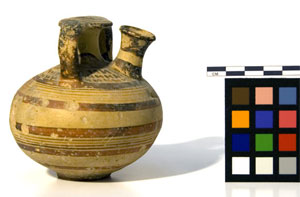

| Vol. XXVI, No. 1April, 2013 |
Articles in Vol. XXVI, No. 1
Digital Data — Ur of the Chaldees: A Virtual Vision of Woolley's Excavations
Preserving data from a very old excavation
-- William B. Hafford
Rethinking CAD Structures — Pompeii Archaeological Research Project: Porta Stabia
Making AutoCAD easier to use effectively
-- Gregory Tucker, University of Michigan, and John Wallrodt, University of Cincinnati
Website Review: Penn Museum
An enormous website with more pluses than minuses.
-- Andrea Vianello
How Often Must We Reinvent the Wheel?
Where do students go to learn about digital technologies?
-- Harrison Eiteljorg, II
Data in the Future — Archived or Locked?
Prison terms for data retrieval?
-- Harrison Eiteljorg, II
Miscellaneous News Items
An irregular feature
To comment on an article, please email
the editor using editor as the user-
name, csanet.org as the domain-name,
and the standard user@domain format.
Index of Web site and CD reviews from the Newsletter.
Limited subject index for Newsletter articles.
Direct links for articles concerning:
- the ADAP and digital archiving
- CAD modeling in archaeology and architectural history
- GIS in archaeology and architectural history
- the CSA archives
- electronic publishing
- use and design of databases
- the "CSA CAD Layer Naming Convention"
- Pompeii
- pottery profiles and capacity calculations
- The CSA Propylaea Project
- CSA/ADAP projects
- electronic media in the humanities
- Linux on the desktop
Search all newsletter articles.
(Using Google® advanced search
page with CSA Newsletter limit
already set.)
Data in the Future — Archived or Locked?
Harrison Eiteljorg, II
(See email contacts page for the author's email address.)
The Digital Millenium Copyright Act (DMCA) is US legislation, passed under and signed by President Clinton. The DMCA was, in part, intended to bring US law into agreement with international law in terms of digital rights management. The US law, however, has created some specific problems for the digital community. In particular for those of us with an interest in access to data in old, perhaps out-dated formats, the US law makes it illegal to reverse-engineer software AND file formats.
It is unclear whether or not this law applies if there is no complainant to assert damages. While it is clear that a violation (for instance, a reverse-engineering project involving a proprietary file format) is a criminal offense, it is not clear that the law would be enforced if there were no harm to an extant person or company.
It is nonetheless worrisome in the extreme that the law does not clearly and unequivocally make it possible for someone to do whatever is necessary to retrieve information from a proprietary file format when no economic harm can be asserted. Imagine, for instance, a data file lying unused for a decade on a university computer, the result of a short-term, limited excavation that produced modest results. Further imagine a scholar wanting to obtain the data from that file but finding the format to be so old as to be unrecoverable except at vast expense or by breaking the law as it now seems to stand — by reverse-engineering the file format. The data in the file could well be hidden virtually forever, since retrieving it could be either unaffordable or illegal — possibly both.
This may seem a far-fetched notion, but it would also have seemed ridiculous to suggest that it would be illegal for a hacker to use his skills to show that an AT&T website was insecure, harming nobody and gaining nothing from the effort except the knowledge, knowledge that said hacker posted to a blog so that it would be seen and fixed. But this has happened, and the "criminal" was charged, tried, found guilty, and sentenced to 41 months in prison. Furthermore, he was fined $73,000 to repay AT&T for its expenses in letting AT&T customers know of AT&T's security failure. To be sure, this ridiculous act was not brought about through the DMCA but a similarly bone-headed piece of legislation called the Computer Fraud and Abuse Act. (For more about this case, which has received wide coverage in the computer press, see the recent piece in the NY Times, "Hactivists As Gadflies," by Peter Ludlow, in the paper version of the Times on Sunday, April 14.)
Some have argued that archaeological data need not be placed in an archive, where the files would be regularly moved to new formats, because reverse-engineering of file formats will always be possible. This matter of the Digital Millenium Copyright Act seems to me to invalidate such an argument against archival preservation of archaeological data. We dare not rely upon future reverse-engineering of file formats if doing so might put a scholar in jail. (There is also the cost issue that must be considered. Would anyone spend the necessary funds to reverse-engineer a file format to acess only small amounts of data? I think not.) It has been predicted that most archaeology will be conducted in museum basements in the not-so-distant future. Much archaeological research will also be conducted with old data sets — but not if lawsuits and potential prison time await the scholar who dares retrieve the data. Or if cost makes the process unaffordable.
-- Harrison Eiteljorg, II

All articles in the CSA Newsletter are reviewed by the staff. All are published with no intention of future change(s) and are maintained at the CSA website. Changes (other than corrections of typos or similar errors) will rarely be made after publication. If any such change is made, it will be made so as to permit both the original text and the change to be determined.
Comments concerning articles are welcome, and comments, questions, concerns, and author responses will be published in separate commentary pages, as noted on the Newsletter home page.